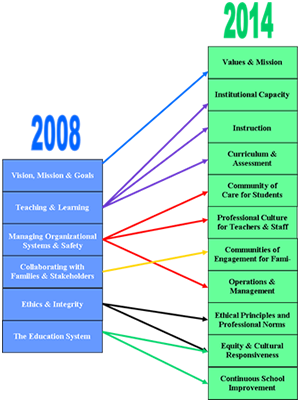- NJASA
- Executive Message - October 2014
-
Standards for School Leaders Proposed for Revision
The Interstate School Leaders Licensure Consortium (ISLLC) has proposed an updated set of standards for school leaders which bring greater emphasis to instructional leadership and focus administrators on addressing factors outside the classroom that impact student achievement. The standards delineate what school and district leaders should know and the critical competencies they should demonstrate to be effective in their work. The standards were first released in 1996 and last revised six years ago in 2008.
The proposed revision is championed by the Council of Chief State School Officers (CCSSO) and the National Policy Board for Educational Administration (NPBEA). The revised standards focus heavily on instructional and ethical leadership while setting standards for improving school climate, engaging the community, and recognizing and embracing cultural diversity.

The revised standards have increased to eleven from six. They include the broad categories from the 2008 version: vision, mission and goals, teaching and learning, managing organizational systems and safety, collaborating with families and stakeholders, ethics and integrity, and the educational system. The new version also addresses social factors that affect education such as poverty and limited English language proficiency. Instructional leadership was addressed mainly in a single section in the current standards. The proposed standards now expand instructional leadership into three categories: instructional capacity, instruction, and curriculum and assessment. As noted in the document describing the draft standards, “Domains such as instructional improvement, distributed leadership, human capital management, equity and access, technology, and continuous improvement emphasize the new educational context in which today’s leaders serve.”
While the standards are not mandatory, we can be sure that they will impact every aspect of preparation, induction, professional growth and evaluation of school and district leaders. In fact, the collaborative work undertaken by NJASA and NJSBA in updating the evaluation program for school superintendents is now focusing on the modified ISLLC standards as essential to the role of the Chief Education Officer and a primary focus for a school board in completing the annual performance evaluation of its district leader.
NJASA leaders, staff and committee members will focus professional development programs and conferences on the ISLLC standards, just as we have done for many years. We will work collaboratively with our colleagues in higher education and the NJ Department of Education to ensure they are paramount in the preparation and licensing of New Jersey school leaders.
Working together we can ensure these standards have their intended impact in developing effective leaders who positively impact students and their learning.



